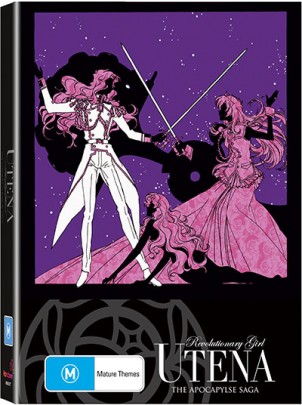
Revolutionary Girl Utena: Part III
Studio: J.C. Staff
Publisher: Hanabee
Format: DVD
Release Date: 4th December 2013
Price: $59.99 – Available Here
Overview
Do you know? Do you know? Have you heard the news? After defending her Rose Bride against countless foes (as seen in Part I and Part II), Utena is about to encounter the greatest threat she has ever faced: herself…also more duellists. Faced with budding emotions that confuse her, our noble Prince to be finds herself contemplating her own desires. Caught in a system where those fuelled by their own perceptions vie for her defeat, can Utena afford to doubt? Will our hero succumb and lose the spark that makes her unique? Or will she manage to retain her identity amidst a chaotic world populated with people too confused to see past themselves?
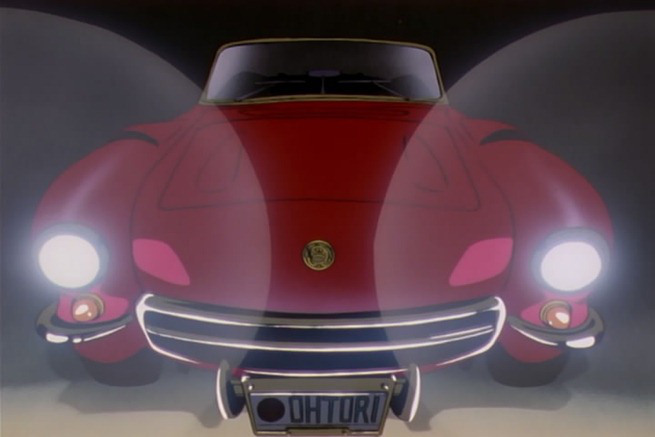
Story
Having defeated the Black Rose Duelists and putting Mikage out of commission, it’s time for Utena to relax and enjoy a regular, peaceful school life…yeah right. With End of the World speaking to them louder than ever, the School Council has decided to take up arms once again against our Prince to be. Though not all members are immediately receptive of the idea of taking up their sword once more, Touga appears to each of them and reminds them of their original motivations, manipulating them into trying again. He implores them to listen for the “Sound that races through the End of the World”, a sound they can only hear if their soul still longs for eternity. When they accept their own desires, a red convertible appears, driven by none other than Anthy’s older brother: Chairman Akio. As they speed down the highway, Touga and Akio reveal to their “passenger” the End of the World, placing a new Rose Crest Ring on their finger. Akio then does a stylish flip and majestically lounges on the front of his car…because he can.
In contrast to the Black Rose Duellists of the previous arc, those who challenge Utena this time around bring with them willing Rose Bride’s of their own. Naturally, this creates a number of strange dynamics throughout the episodes. A lot of scorned lovers going around Ohtani Academy. Also, as it has been before, the title of Rose Bride isn’t exactly gender specific. Nanami chooses her brother Touga as her bride, not that that wasn’t entirely expected. For the first time in the series, challengers attempt to best Utena and Anthy’s bond, rather than just Utena as a duellist. Utena’s own connection to the Rose Bride is called into question when, during her duel with Seonji, the sword of Dios vanishes from Utena’s grasp. With no sword to defend herself, Anthy leaps to her defence and reverses roles by drawing a blade from Utena’s chest. Just as with everything else in the series, this has a far greater meaning than originally appears. The sheer fact that Utena can manifest a sword at all expresses the emergence of her inner strength and the ability to fight on her own. Anthy’s reaction to Utena in peril, along with her desire to aid Utena in realising her power also disperses the idea that Anthy is a mindless doll with no will of her own, a theme that has been present since the beginning of the series.
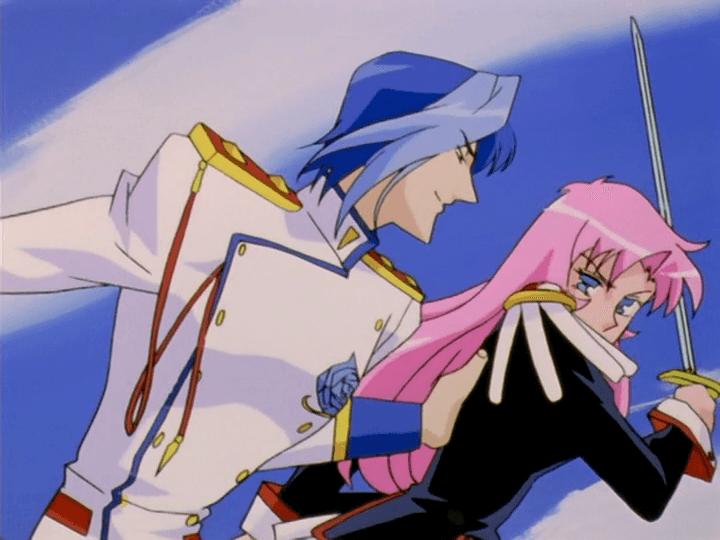
As the episodes progress, we learn more about the rather mysterious Akio. A controlling force who pulls the strings of countless people, Akio is inextricably connected to every major player in the Rose Duels. To maintain his hold over people, he utilises seduction…with no exceptions. He honestly doesn’t care who it is, if he can manipulate them, he will. Everyone from Utena, to Touga, even his fiancée’s mother. Quite the playboy, which, in a school filled with impressionable and naive schoolgirls is a rather dangerous trait. Akio’s mere presence brings out a new side of the generally tough Utena. As she develops feelings which she herself tries to quell, she becomes more like shy, nervous girls she normally stands out from. Though not inherently a bad thing at the outset, after a while Utena’s more reserved persona begins to lead her away from the goal she has chased her entire life: to become a prince.
The finale of the Akio Ohtori saga sereves as a recap of the duels thus far. These flashbacks are bordered by Akio driving through the streets in his symbolic convertible, listening to the Shadow Girls host a radio show. Throughout the episode, the Shadow Girls present Akio with a series of multiple choice questions thematically relevant to each duel. They ask of the definitions for eternity and miracles, the answers being left ambiguous as Akio never provides any. The episode also features Utena talking to somebody off screen, musing about the day they’ve had and the fun they shared. During what seems like a normal discussion about lunch however, Utena becomes more and more distressed as she struggles to make a decision. This seemingly simple moment actually houses one of the largest character developments of the series and shows Utena at one of her most vulnerable points.
The final few episodes focus intensely on the ever evolving relationships between Utena, Anthy and Akio. As these three continue to interact in various way, emotions become confused and each begins to reveal new aspects of themselves. Utena continues to express a more feminine side, so much so that Jury and Miki note that there’s something almost “lesser” about her. Anthy on the other hand reveals a darker nature as jealousy and guilt rise within her. Only Akio seems relatively unfazed as his manipulation continues and he strives for his one true goal: power.
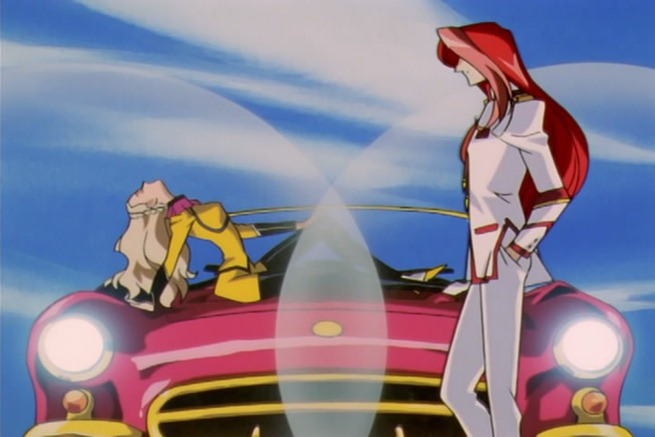
Visuals
Just as in the previous arc, the arenas in which characters duel are lined with objects relevant to the current conflict. However, unlike the previous battles, each duellist does not receive their own unique item. In each and every duel, multiples of Akio’s car rise from the arena. Not only the physical example of the same force that gathered the duellists, it serves to represent their drive (for once no pun intended). When Utena ultimately bests her opponent, the car crashes in representation of their inability to proceed along their course, as well as the personal damage caused by their loss.
Along with this new batch of duels, comes a new transformation sequence for Utena and Anthy. Rather than ascending the spiral staircase as she has before, Utena instead rides the newly revealed elevator, along with Anthy. As the two ascend, Anthy transforms Utena’s outfit as she has before, after which she herself dons her Rose Bride gown. In addition to this, Anthy’s own school uniform lies on the ground beneath them, surrounding an infant plant. The further Utena’s transformation progresses, the larger the sprout becomes, eventually filling out the uniform and blooming roses. More symbolism. Speaking of…
As per usual, the series also contains a plethora of symbolic visuals that consistently appear throughout the episodes. In one particular episode, eggs become very symbolic to the story of Nanami, serving as the representation of puberty. In another, candles depict the loss of innocence as they are slowly put out. Stars, a baseball match, injured ankles also appear too often to be a coincidence. Each serves to lace every moment of the series with extra meaning that you can construe in whatever way you so desire. It’s just one of those shows.
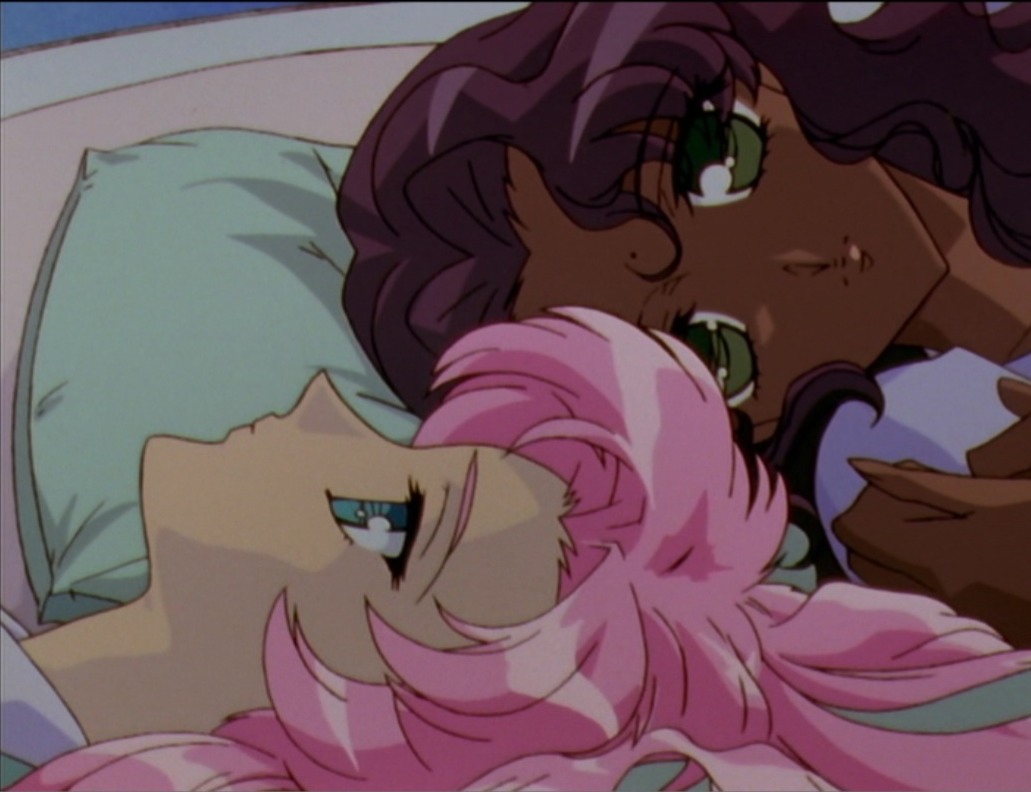
Audio
Just as it has since the beginning, the choral rock tune “Zettai Unmei Mokushiroku (Absolute Destiny Apocalypse)” continues to play before each duel begins. The dramatic nature of the song serves to express the intense nature of the conflict along with the fantastical elements of the entire rose competition set-up. Similar tunes throughout the series also support the epic nature of symbolism, their lyrics providing yet another layer of meaning to each moment.
Though the English dubs continues to be…less than stellar, these final sagas are not nearly as grating as the earlier episodes. Due to the much more subdued and intense nature of the dialogue, the character’s overall lack of emotive volume is concealed. The voicing actually lends rather well to the introspective narration each character employs. This is beneficial to the series as these sombre moments tend to be the most powerful and plot relevant.
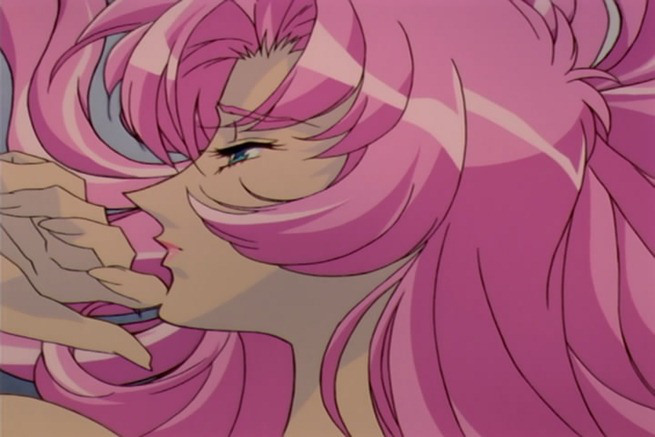
Extras
Like those before it, Part III includes a book filled with extras. Episode commentary and an interview from director Kunihiko Ikuhara Part 3, the making of Be-Papas Studio Part 2, along with a number of crew interviews and art galleries. The book also contains some information regarding the Utena movie and a section devoted to answering question that fans of the series posed to Ikuhara himself. The final disc of the collection features a number of interviews with the crew and cast of both the Japanese and English versions. Also included is another animated art board, the Japanese trailer for the box set and both the original and remastered US trailers for the series. Last but not least, there is chance for you to get a little musical with Karaoke versions of the series’ many songs…if you can read the Japanese lyrics that is.
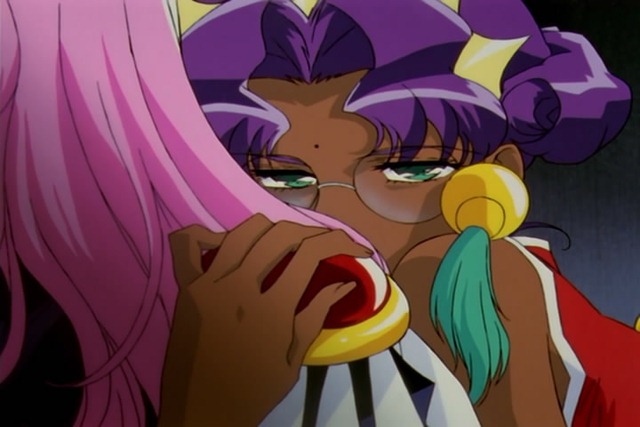
Overall
During its final sagas, Revolutionary Girl Utena continues to explore complex issues amidst a sea of symbolism. Every one of its oblique visual elements and haunting tunes express the twisted nature of the plot as well as the characters themselves. That being said, the final arc handles certain symbolic elements with a tad more subtlety that earlier episodes, providing a sense of maturity. Though the Black Rose Saga indeed possessed a dark kind of maturity, these final episodes deal more with the restrained and uncertain development of characters, rather than their previous twisted misconceptions of growing up. The fact that some relationships reach an intensity on the physical level definitely adds weight to what were previously mere imaginings of what a “relationship” was. In case you haven’t figured it out by now, this isn’t a straight forward kind of series. Revolutionary Girl Utena does a good job in wrapping up the various plot threads that wove the greater story and creates a truly unique narrative. That being said, you’ll definitely want to focus on everything little thing that happens, otherwise the series may seem shallow. But if Utena teaches you one thing, it’s that things aren’t always as they appear, be that good or bad. Though you might not discover which before it’s too late. Do you know? Do you know? Do you know how it ends?

Capsule Computers review guidelines can be found here.

